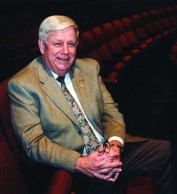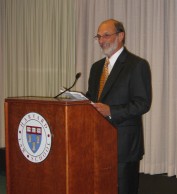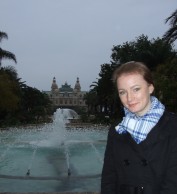STILLPOINT Archive: last updated 04/09/2009
Behind the Award: An Enduring Hero
Calen Rubin
Jack Good
’66 is known mainly for two things: his selfless, friendly demeanor and
his endless professional and charitable contributions to the local
North Shore communities. Longtime friend Jon Tymann ’83, senior
director of development at Gordon, says, “Jack is the consummate
volunteer. He’s on every committee, every board, and not for accolades
but because of the work he can do for others.”
Good received the
2008 Enduring Hero award at the Sixth Annual American Red Cross
Community Heroes Breakfast held at the Danversport Yacht Club
(Massachusetts). The award, according to the American Red Cross
website, is given to “an individual who has a significant history of
making a difference in the community through his or her professional
and/or volunteer activities.” The award describes Good--a generous
contributor to his community and its individuals--perfectly.
Good’s
professional contributions include serving as executive vice president
of Beverly National Bank and vice president of community relations,
marketing and development at both Gordon College and Beverly
Hospital/Northeast Health Systems. He also served as national chairman
for the Association for Healthcare Philanthropy and chairman of the
board for the American Heart Association, Massachusetts Affiliate Inc.
The
award not only honored Good’s many professional and charitable
contributions, but his exemplary stature in his personal life as well.
Good has innumerable friends and is known as the “go-to guy” for people
new and looking to acclimate to the area. For the past 25 years Good
and his family have also accompanied Santa to Beverly Hospital on
Christmas morning.
Despite his many accomplishments, Good
remains humble. He says, “God has blessed me through each of my job and
volunteer experiences over the years and has given me the love and
support of a wonderful wife and family.”
To the people close to
Good, he has a reputation for being “a great listener and
advice-giver,” selfless, generous, and an example of “integrity,
humility, energy and compassion” in his community.
A Third View
Recently Roy Clouser ’61 delivered the annual Kuyper Lecture sponsored by the Center for Public Justice. The lecture, entitled “A Third View of Rights and Law: A Critical Assessment of the Assumptions behind the Declaration and the Constitution,” argued that the Declaration and the Constitution are at odds over the nature of rights and the basis for lawmaking, and that any adequate account of the foundations of law must include Abraham Kuyper’s Christian principle “sphere sovereignty.”
Clouser said the Declaration assumes a version of “natural law” theory, claiming that rights can neither be created nor destroyed by humans, making them “unalienable.” The Constitution, on the other hand, does not contain a single unalienable right; every right it mentions is an amendment that can be repealed. Clouser maintained that these documents contain important truths, but that those truths are skewed and by themselves are still inadequate and need to be supplemented by a “third view” of the basis for rights and laws.
This third view acknowledges a universal norm of justice but points out that it is too vague to help with the shortcomings of each document. The “sphere sovereignty” principle guides the norm of justice by opposing individualism and collectivism. It also limits governmental authority by recognizing authorities in other “spheres” of life such as families, churches, businesses, schools, etc. According to sphere sovereignty, each of these (and other) organizations should be free to regulate its internal affairs without interference by others, and it is a duty of government to ensure that freedom.
The lecture, delivered at Harvard Law School, had a question and answer session immediately following, where an excellent discussion ensued.
Clouser, a philosophy major while at Gordon, attended Harvard Graduate School and later transferred to the University of Pennsylvania, where he earned his Ph.D. He is professor emeritus in the Philosophy Department of The College of New Jersey.
Information courtesy of Harold Heie, founding director of the Center for Christian Studies
_____________________________________________________________________________________________________
Victory Deferred
The Smithsonian National Museum of American History recently accepted the Victory Deferred collection by John-Manuel Andriote ’80. It includes audio recorded interviews, transcripts, research materials and manuscript drafts related to his book Victory Deferred: How AIDS Changed Gay Life in America (University of Chicago Press, 1999). The museum describes the collection as “one of the most comprehensive HIV/AIDS archives” in America. Andriote is coproducing with BBC Radio on How AIDS Changed America, a program featuring excerpts from his Victory Deferred interviews.
_____________________________________________________________________________________________________
A Scholarly Community
Calen Rubin
Graduate school looks bright for Ian Corbin ’06 and Kirstin Hasler ’07 (pictured above), who received fellowships from the Lilly Graduate Fellows Program last spring.
Awarded to 15 graduates who are entering doctoral programs in arts and humanities and are seriously considering working within church-related academic institutions in the United States, the fellowship provides funding and the support of a scholarly community.
After graduating summa cum laude from Gordon, Corbin and Hasler completed master’s degrees at Yale Divinity School and Queens University Belfast respectively, and began Ph.D. and doctoral programs this fall.
Corbin is studying political philosophy and philosophy of art at Boston College. “The decision to spend five years on a Ph.D. is an exciting one, but it comes with definite costs and difficulties,” he says. He hopes to write and teach in the future.
Hasler entered Notre Dame to study international relations and political theory. She hopes to teach at a small liberal arts college and is grateful for the opportunity to study with fellows “who all have the common vision of being well-rounded scholars and teachers.”


